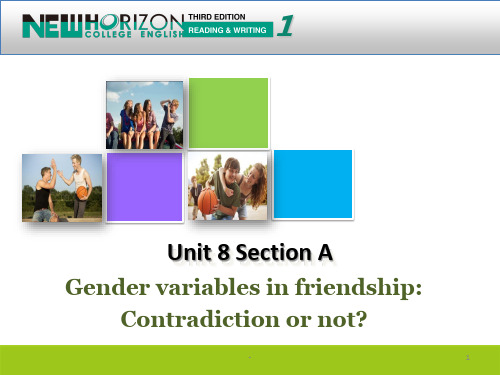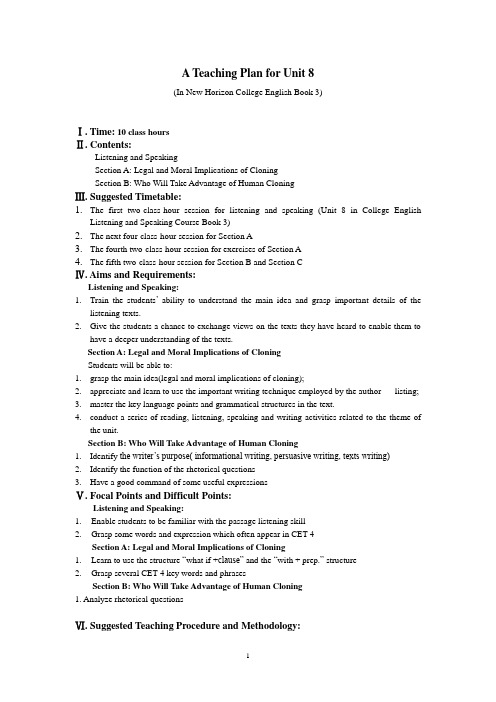新视界大学英语综合教程3unit8PPT课件
- 格式:ppt
- 大小:2.17 MB
- 文档页数:150






A Teaching Plan for Unit 8(In New Horizon College English Book 3)Ⅰ. Time: 10 class hoursⅡ. Contents:Listening and SpeakingSection A: Legal and Moral Implications of CloningSection B: Who Will Take Advantage of Human CloningⅢ. Suggested Timetable:1.The first two-class-hour session for listening and speaking (Unit 8 in College EnglishListening and Speaking Course Book 3)2.The next four-class-hour session for Section A3.The fourth two-class-hour session for exercises of Section A4.The fifth two-class-hour session for Section B and Section CⅣ. Aims and Requirements:Listening and Speaking:1.Train the students’ability to understand the main idea and grasp important details of thelistening texts.2.Give the students a chance to exchange views on the texts they have heard to enable them tohave a deeper understanding of the texts.Section A: Legal and Moral Implications of CloningStudents will be able to:1.grasp the main idea(legal and moral implications of cloning);2.appreciate and learn to use the important writing technique employed by the author---- listing;3.master the key language points and grammatical structures in the text.4.conduct a series of reading, listening, speaking and writing activities related to the theme ofthe unit.Section B: Who Will Take Advantage of Human Cloning1.Identify the writer’s purpose( informational writing, persuasive writing, texts writing)2.Identify the function of the rhetorical questions3.Have a good command of some useful expressionsⅤ. Focal Points and Difficult Points:Listening and Speaking:1.Enable students to be familiar with the passage listening skill2.Grasp some words and expression which often appear in CET-4Section A: Legal and Moral Implications of Cloning1.Learn to use the structure “what if +clause” and the “with + prep.” structure2.Grasp several CET-4 key words and phrasesSection B: Who Will Take Advantage of Human Cloning1. Analyze rhetorical questionsⅥ. Suggested Teaching Procedure and Methodology:Listening and Speaking: (an interactive approach is introduced)1. Pre-listening Task: arrange the students in pairs and ask them to discuss the followingquestions:(1). Do you have any friends who are left-handed? Do you find them special in any way?(2). What might happen if a left-handed child is forced to become right-handed?(3). Do you think left-handed people are more intelligent than right-handed people? Why or whynot?(4). What advantages and disadvantages do left-handed people have?Some key words and expressions in Language Focus:baffle: v. 1.be too difficult for sb to understand; puzzlee.g. One of the exam questions baffled me completely.2. prevent sb from doing something; frustratee.g. She baffled all our attempt to find her.2. Background Information:Handedness means a preference for the use of either the right hand or the left hand.According to statistics, approximately 75% of the human population is strongly right-handed, and approximately 90% is predominantly right-handed. Among the remaining 10%, some people are strongly left-handed, and others are left-handed for some activities and right-handed for others.Since ours is largely a right-handed world, people in many cultures used to regard left-handedness as abnormal. And left-handed people often have a tough time trying to adapt to the ways things were. At present, however, people are more understanding and almost all left-handed children are allowed to write with their left hands.Why some people are left-handed has been puzzling scientists for a long time. However, up to now no one has come up with a definitive answer, because no gene for left-handedness has been identified. But it does seem to run strongly within a family.3.Listening to text 1 and 24.Speaking tasks: ask the students to get into pairs and explain to them how to carry outSpeaking Task A—reflections on the texts, then select a pair to present their views in class.Section A: Legal and Moral Implications of Cloning1. Background Information1.cloning: the process of making a genetically identical organism through nonsexual means.2.DNA: (脱氧核糖核酸) the chemical at the center of the cells of living things whichcontrols the structure and the purpose of each cell and carries genetic information during reproduction.2.Pre-reading ActivitiesPlease listen to a short passage twice and answer some questions1.From a medical standpoint, what are the positive and negative effects of human cloning?2.From a social and moral standpoint, do you think cloning would be a good thing for humans?3.What is your opinion of genetic engineering, i.e. the deliberate altering of genes to createhuman beings according to certain requirements?听力原文:The creation of Dolly, a cloned sheep, has aroused great attention around the world. Wenow live in the reality of human cloning. This suggests, on one hand, great medical development and possibilities in curing previously incurable diseases. On the other hand, human cloning has brought confusion and fear to people who worry that it would threaten human society and dignity. If humans are produced, whom will we respect as ancestors, father, or mother? Will cloned people be true humans? The problem really is the creation of a new world order of humans.Answers:1. From a medical standpoint, what are the positive and negative effects of human cloning?It suggests, on one hand, great medical development and possibilities in curing previously incurable diseases.2. From a social and moral standpoint, do you think cloning would be a good thing for humans? Human cloning has brought confusion and fear to people who worry that it would threaten human society and dignity.3. What is your opinion of genetic engineering, i.e. the deliberate altering of genes to create human beings according to certain requirements?The problem really is the creation of a new world order of humans.3. Work on Section AA) Text Structure AnalysisThe essay focuses on one central theme: the legal and moral implications of cloning. It could be divided into four parts.Part 1 (Para.1): background situation of the passage--- with the success of cloning an adult mammal, a world with human clones was suddenly within reach.Part 2 (Paras.2-3): responses to the background situation mentioned in Para.1.Part 3 (Paras.4-18): a list if puzzles or questions.Part 4 (Para.19): Conclusion--- the list of questions could go on; people are just beginning to wonder about the future of the world after cloning.B) Raise some questions to make students grasp some detailed information in the text(question and answer method is used)P art 1 (Para.1)Question:(1) What caught the imagination of everyone?Answer: Word last week that a scientist named Ian Wilmut had succeeded in cloning an adult mammal.Part 2 (Paras.2-3)Questions: (1).To the first successfully cloned sheep, what are the responses from governments?(2). And how do scientists react to it?Answers: (1). Governments hurried to draft guidelines for the unknown future and President Clinton ordered a national commission to study the relative issues. Some countriesbegan examining the moral implications of cloning other species. (Para. 2)(2). Like the Theory of Relativity, the splitting of the atom, and the first space flight,cloning has generated a long list of difficult puzzles for scientists. (Para. 3)Part 3 (Paras.4-18)Questions: (1). How many puzzles or questions are mentioned in this part? And what are they?(2). What is the greatest concern about human cloning for society?Answers: (1). Six puzzles are mentioned. Why would anyone want to clone a human being in the first place? Will it be possible to clone the dead? Would a cloned human be identical tothe original? What if parents decided to clone a child in order to harvest organs? Howwould a human clone refer to the donor of its DNA? What are the other implications ofcloning for society?(2). The greatest concern is genetic engineering—the deliberate altering of genes tocreate human beings.Part 4(Para.19)Question: (1). Will questions about cloning end soon?Answer: No. The list of questions will go on.nguage PointsP art 1 (Para.1)1. At first it was just plain surprising.plain: ad. obviously; plainly; unmistakably (“Plain” is often used informally for “Plainly”)e.g. What Tom said was plain wrong.2.Word last week that a scientist named Ian Wilmut has succeeded in cloning an adultmammal—an achievement long thought impossible—caught the imagination of everyone. Meaning: The news that a scientist named Ian Wilmut had successfully cloned an adult mammal led people to imagine a lot. His successful clone was an achievement that has beenthought impossible for a long time.word: a piece of news or message (in this sense without a or the)e.g.. Word came that I was needed at home.有消息传来说家里需要我。